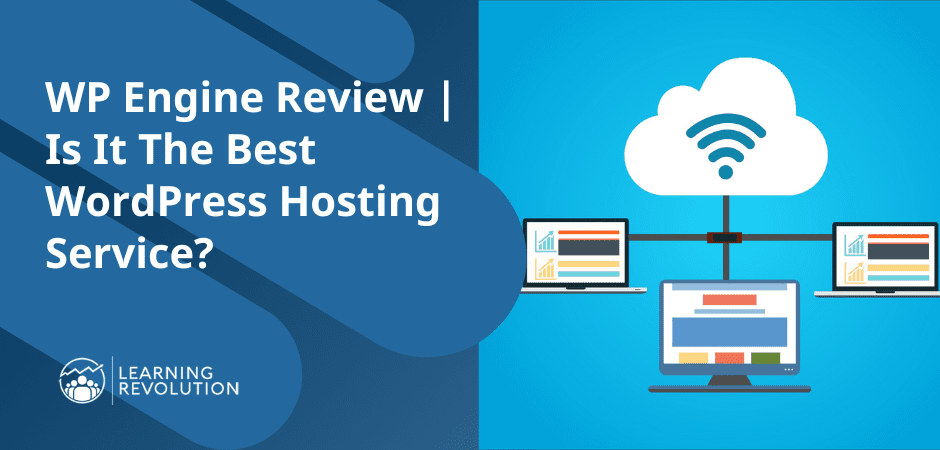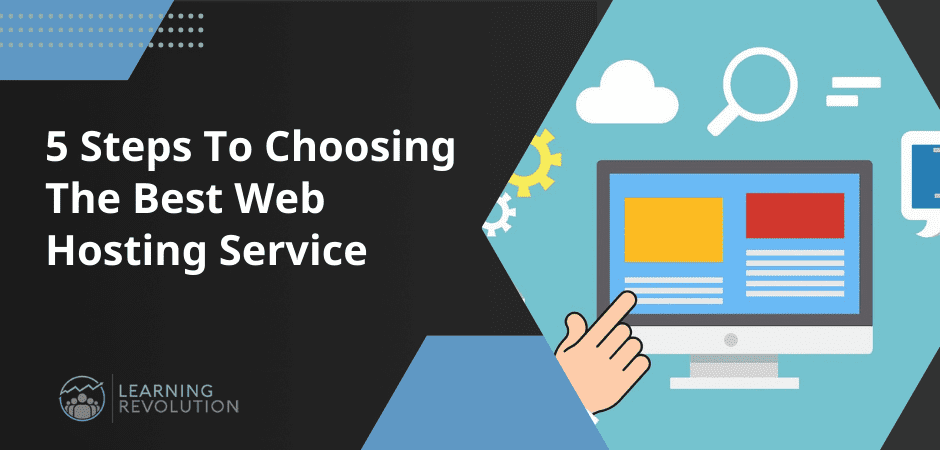

One of the biggest challenges in choosing the right web hosting service for your business is knowing where to start.
Most articles and guides on this topic are overly focused on selling specific web hosting companies without considering whether they’re the right fit for a user.
But this article is different.
Instead of giving you names from the start, we’ll describe the steps you must follow when choosing a hosting company for your site. In addition, we’ll tell you the main performance and user-experience factors you must consider in your buying decision. And finally, we’ll give you a list of web hosting companies we trust based on our experience.
So, by the end of this guide, you’ll have all the information you need to find the best web hosting company for your business.
Sound good? Let’s dive in.
What Is A Web Hosting Service, And Why Do You Need It?
A web hosting company provides the necessary services, technical support, and infrastructure to register, host, and operate your website. It ensures that your site is accessible to all internet users and provides a seamless user experience to your visitors.
Specifically, a web hosting service does the following things:
- Registers your website domain.
- Provides you with web space to upload and save your website’s files.
- Allows internet users to access your website content.
- Protects your data from unauthorized use and ensures your website runs smoothly without interruptions.
Every web hosting company offers these essential services.
But the best ones offer better server speeds, more robust security, and a wide range of apps, tools, and features to help you build, run, and manage your websites conveniently.
Some of the most popular web hosting companies are Bluehost, Hostinger, Nexcess, WP Engine, and SiteGround.
How To Choose The Right Web Hosting Service For Your Business
Every web hosting company has strengths and weaknesses. So, there’s no one-size-fits-all solution to web hosting. This is why, instead of recommending one company, we’ll discuss the factors you must consider when choosing a hosting service for your website.
Let’s do this step by step.
Step 1: Consider Your Website Type And Business Needs
First, you must consider your website type, business goals, and budget when choosing a web hosting service because every website has different needs.
For example, if you want to start a high-traffic site like Nerdwallet that makes money with advertising and affiliate marketing, you’ll need to build a lightning-quick website with no traffic caps.
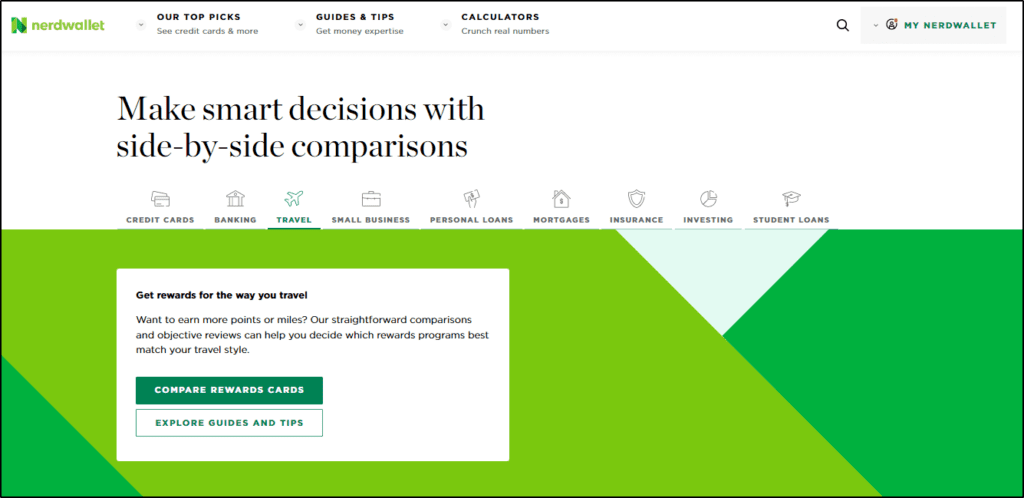

Similarly, if you plan to sell courses and memberships on your site like SmartMarketer and drive most of your traffic from search engines, you must look for a high-performance hosting service.


If you want to start an online store to sell physical or digital products like Bumblebee Linens, you‘re better off looking for an eCommerce web hosting company optimized for such businesses and supports payment gateways.


Or, if your target audience is primarily based in a specific country, look for a high-quality hosting company with servers in that region.
But if you want to create a corporate website that only serves as your company’s contact point, you can do it with an entry-level hosting service at a lower price.
So, before moving forward, you need to be clear about your website type, estimated traffic goals, business model, and how you plan to make money from your site.
In addition, consider your budget and how much you’re willing to spend monthly or annually on your hosting service.
The cheapest services cost around $3/month, while the high-end hosting services can exceed $200/month.
Step 2: Choose The Right Website Hosting Type
Next, you need to decide the kind of web hosting service you need to run your website smoothly and reach your business goals without overspending on your hosting service.
Technically, there are several types of web hosting services offering different server resources and hosting infrastructure.
But you’ll mainly have to choose between the following hosting types.
● Shared Hosting
In a shared web hosting service, you must share the server resources with other websites. A shared web hosting company stores all its customers’ data on the same servers and distributes its processing power, memory, disk space, and bandwidth between them.
Shared hosting is ideal for beginners and low-traffic websites as it is affordable and offers all the necessary tools and features to run your website smoothly.
However, it comes with several limitations and disadvantages.
For example, shared hosting speed varies with server load resulting in an inconsistent user experience for your website visitors. For instance, if one website on a shared server sees a sudden traffic spike, the other sites on that server can slow down or become unavailable.
Similarly, your site’s security on a shared server is partially linked to the other sites. So, if hackers use a security loophole to access one site on a server or gain access to the server’s operating system, the other sites on that server are also at risk.
However, this rarely happens with the top shared hosting companies.
In short, a high-quality shared web hosting service is your best option if you’re a beginner with a site under 30K visitors per month or a limited budget.
● Dedicated Hosting
As the name suggests, dedicated hosting services dedicate server resources for your website only. This means you don’t have to share server space, processing power, or bandwidth with other websites.
This results in faster server speeds, more robust security, almost zero downtimes, and much more consistent and reliable website performance.
Dedicated hosting is ideal for high-traffic websites and businesses that rely mainly on online sales.
However, dedicated hosting is expensive and comes with traffic, server space, and bandwidth caps. In addition, it often requires a certain degree of technical expertise to manage a dedicated hosting account.
Still, if you have the budget and want your site to be always available at lightning speeds, dedicated web hosting is the way to go.
● Managed WordPress Hosting
Most bloggers, content creators, digital product sellers, and small businesses use WordPress for their websites because of its user-friendliness and affordability. However, managing a WordPress website requires a certain level of technical expertise. This is a challenge for most non-technical founders and website owners focused on their core business functions instead of website management.
A managed WordPress hosting service resolves this problem by handling your site’s backend management. As a result, you don’t have to worry about updating website security, plugin updates, hosting space management, and anything else related to the technical side of website hosting.
It is an advanced form of dedicated hosting where your site enjoys separate server resources and a dedicated team to ensure its hosting features run smoothly.
Managed WordPress hosting is expensive compared to shared hosting. But it offers greater security, speed, and reliability. So, if you have the budget, a managed hosting service allows you to focus on your core business while it handles the technical stuff.
So which web hosting type should you get?
It depends on your business requirements, website type, and budget. If you’re just starting a new site and have limited resources, a shared web hosting service is the best choice.
But if your site is growing, you want zero downtimes, and have the budget to afford it, a managed or dedicated hosting service is the way to go.
Step 3: Consider The Key Web Hosting Features
There are hundreds of companies offering shared and dedicated web hosting services. To find the right fit for your business, you must evaluate its core web hosting features.
Here are the key features to consider.
● Storage
Every web hosting company provides you with storage space to upload your website’s files and content. How much storage you need depends on the size of your files. For example, if your website has 10GB of data, it’ll need at least twice the space to function properly.
For most blogs and small business sites, 30GB to 50GB storage is more than enough. Hostinger’s shared web hosting plans are a good example.


On the other hand, managed and dedicated hosting services offer lesser storage but higher performance. For example, WP Engine offers only 10GB in its entry-level plan. But since it’s a dedicated hosting company, this storage capacity is enough for a small business website or blog.
Read the full WP Engine Review.
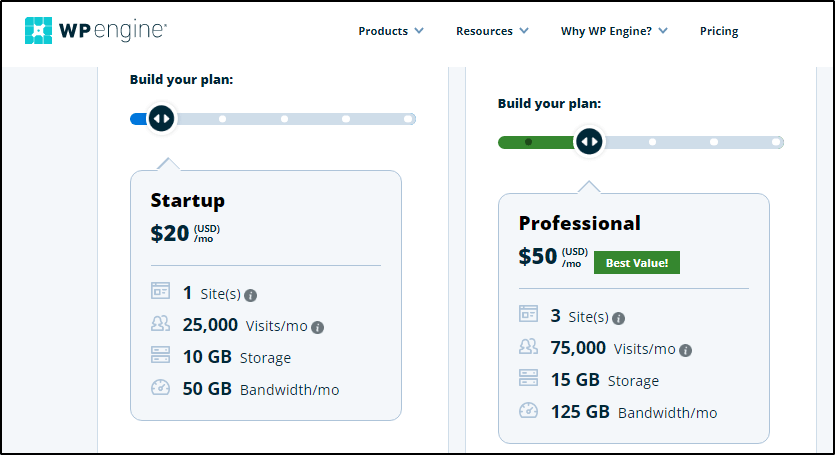

So, when evaluating a web hosting service, ensure it offers enough space to store your data and allows you to grow.
● Bandwidth
The amount of data transferred on your site (uploads and downloads) makes up its bandwidth. For example, if you upload 5GB of data in a month while your website visitors download 30GB, your total bandwidth for the month would be 35 GB.
Most shared hosting companies offer unlimited bandwidth, meaning visitors can download as much data from your site as they want. However, this usually comes with a fair use clause.
In comparison, dedicated and managed web hosting companies put caps on your monthly bandwidth. But they offer much faster data transfer. If a site exceeds its monthly bandwidth limit, it usually becomes unavailable to visitors until its limits are refreshed the following month.
Which one should you go for? Depends on your website and traffic goals.
For example, if you build a viral content site relying on advertising revenue, unmetered bandwidth is the better option.
But if you have a fair idea of how much data transfer takes place on your site every month, you can opt for metered bandwidth with a dedicated hosting company.
● Domain Registration
Your domain is the URL users type in their browsers to visit your website. Without a domain name, your site’s content is inaccessible to regular internet users.
Some web hosting companies offer free domain registration as a part of their hosting package. However, many top-tier hosting companies charge separately for a domain.
But your domain suffix is the other critical thing to consider. The most common ones are .com, .org, .net, and .us, which most hosting companies offer.
But you’ll have to look harder for companies offering region-specific domains like .ca, .in, .my or a creative suffix like .agency, .music, .store.
So, before signing up, make sure your hosting company has the domain name you want.
● Security
Website security is critical not just because you don’t want any hacker to take over your site but also because Google considers website security a key search ranking factor. So, when evaluating two identical sites, Google would rank the one with better security higher in the search results.
Here are the core security features you must look for in a web hosting company.
SSL certificate (HTTPs): An SSL certificate encrypts the connection between a browser and your web server, preventing any third-party access to modify your data. Google requires all sites to have at least a basic SSL certificate and shows a warning message for sites without one.


Firewalls: The best web hosting companies protect their customers from malware, unauthorized data access, and DDoS attacks using multiple layers of firewalls.
User access management: Your web hosting service should have strict access rules where only authorized users can log in to your account. It should also offer two-factor authentication, partner accounts, recovery accounts, and separate user profiles for billing and regular operations.
Regular updates: The best web hosting companies continuously update their security standards to combat new cyber threats. They do this through infrastructure upgrades, software updates, and optimizing their processes to detect and prevent cyber-attacks.
Data backup and restoration: Regular backups are critical to your data security which is why the best web hosting companies offer daily data backups and one-click restoration features.
Read our comprehensive list of critical website security tips for content creators.
● Email Hosting
Do you want to create an email address with your domain name ([email protected])? If yes, you must ensure your web hosting company also offers email hosting services.
Most web hosting companies allow you to use your web hosting account for emails as well. However, some companies charge separately, while a few don’t offer email hosting at all.
If email is vital for your business, make sure your hosting company provides email hosting.
In addition, it should also offer a built-in interface for managing your email account or allow you to configure it with third-party email tools like Outlook or Gmail.
Step 4: Evaluate Web Hosting Performance
The performance of your web hosting service directly impacts your website’s search rankings, user experience, and conversion rates.
So, you must carefully examine the following factors before your purchase decision.
● Server Uptime And Reliability
Web hosting services store your website data on their servers. Depending on their technology and hosting type, these companies manage their server load using temporary shutdowns or downtimes when your site becomes inaccessible.
Server uptime is the percentage of time your site is online during a month. Ideally, your site’s uptime should be 100%, but that’s rarely the case. Even the best web hosting companies experience downtimes, although they’re quite brief.
Shared web hosting services usually have more extended downtimes. But the best ones still commit 99.9% monthly uptime.
Many dedicated web hosting services commit 100% uptime and try achieving it by shifting your site’s content between servers during downtimes. Still, even a 99.9% uptime is acceptable as long as the downtimes don’t occur during peak hours.
How do you test a web hosting company’s average uptime?
Thankfully, there’s a lot of information already available online. For example, you can use this Pingdom tracking tool to check the average uptime of some leading web hosting companies.
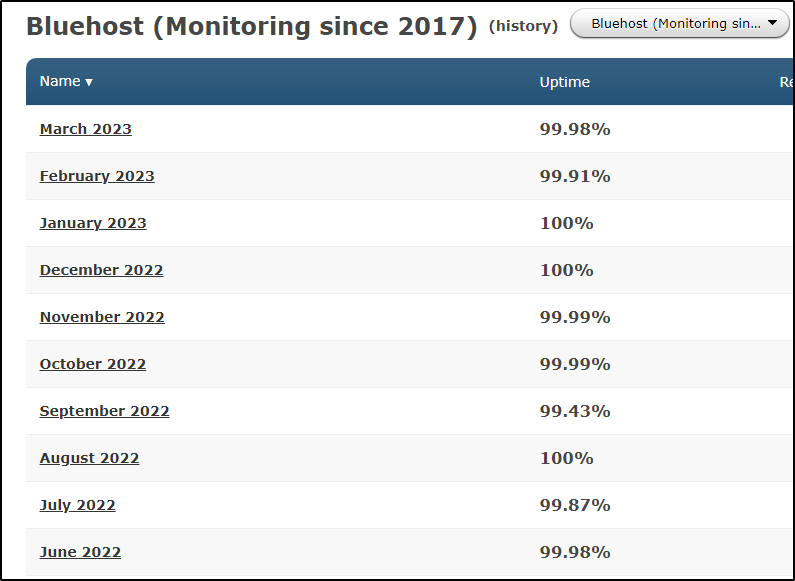

As you can see, the screenshot above shows the average monthly uptime of Bluehost, a leading web hosting company. Its worst uptime percentage in the last ten months is 99.43%. Most of the other months had either around 99.99% or 100% uptime.
● Server Speed And Response Time
Server response time is the time it takes your website to start loading after a visitor enters its URL in their browser. It is perhaps a web hosting company’s most critical performance metric because of its impact on your site’s user experience and rankings. Google takes website speed seriously and, when evaluating identical sites, ranks the faster ones higher.
Server response time mainly depends on the speed of your web hosting servers, although several other factors also influence it.
What’s a good server response time? Anything between 100ms to 300ms is excellent. But even a response time of under 1 second is acceptable. But anything above is too slow.
Here are the average monthly response times of Nexcess, a dedicated WordPress hosting company.
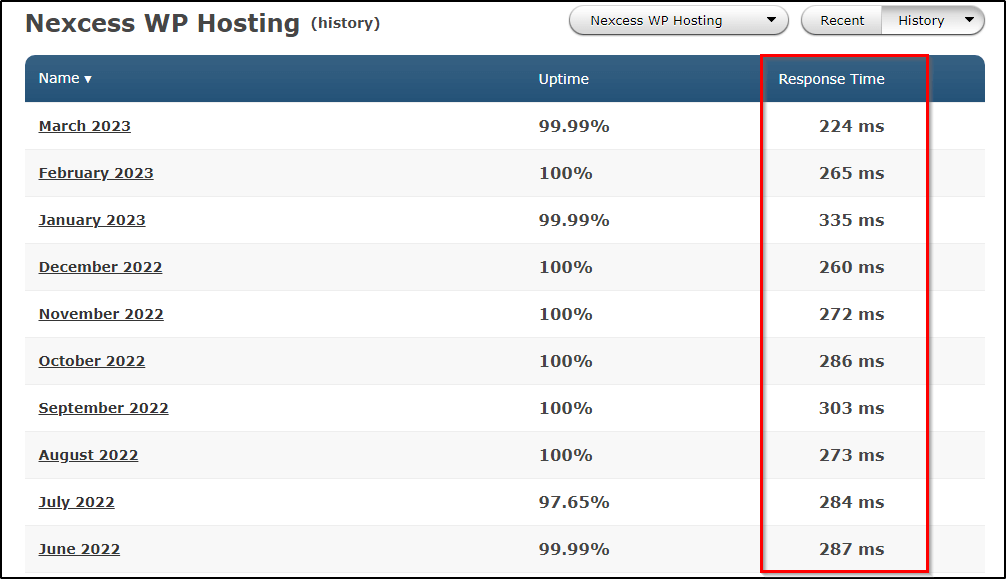

Understandably, dedicated web hosting usually has much faster response times than shared hosting. However, many of the top shared hosting companies, like Hostinger and A2Hosting offer lightning server speeds as well.
● Scalability
As your website grows, your web hosting service should have the necessary infrastructure and server resources to handle increased traffic and higher demand.
This is critical because switching web hosting services is a time-intensive process you don’t want to repeat too often.
So, ideally, you should choose a scalable web hosting service capable of handling your site’s growth.
How do you determine if a web hosting service is scalable?
Look at their pricing plans and see if they allow you to upgrade your subscription with time. Some web hosting companies are inherently scalable and price your subscription based on your monthly traffic.
As your traffic increases, you can opt for higher limits and pay more only when necessary.
Step 5: Check For User Experience And Ease Of Use
Managing a site’s web hosting account can be challenging for non-technical users. However, the best hosting companies make it a breeze by giving you the tools and resources to easily handle your site’s hosting even if you’re a beginner.
So, before purchasing a web hosting service, make sure it offers an excellent user experience using the following tools.
● Control Panel
Your hosting account’s backend interface or control panel lists all its settings, features, tools, and options. This is where you can register new domains, create new email accounts, check your storage and bandwidth status, access coupons, configure integrations, and renew your account.
For example, here’s the backend control panel of Bluehost.
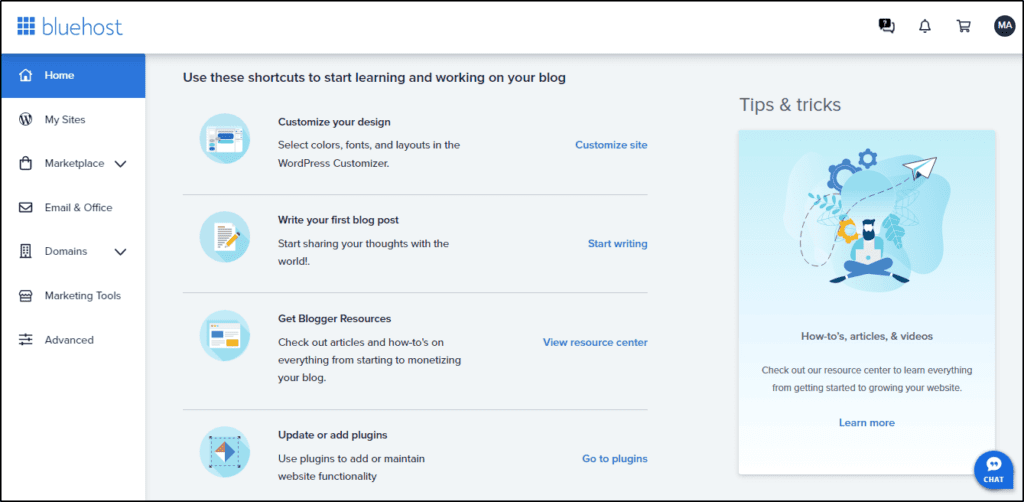

It also gives you the option to access the classic cPanel interface with more advanced options.
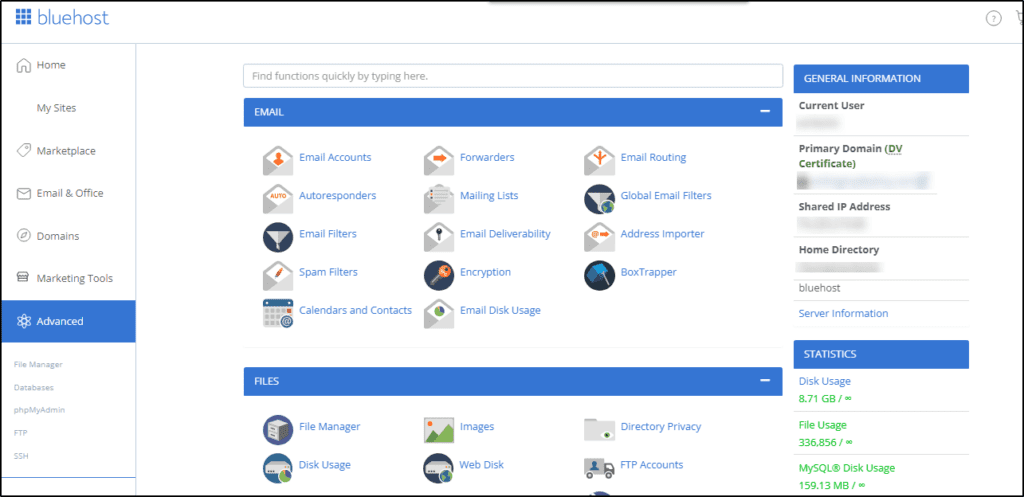

Not every hosting company has a user-friendly backend. So, you must ensure the one you choose is designed for non-technical users and doesn’t make day-to-day site management unnecessarily complex.
● WordPress Compatibility
Whether you’re starting a blog, an online course website, a small business site, or an eCommerce store, you’ll likely use WordPress to build it.
Why? Because 63.4% of all websites using a content management system (CMS) are powered by WordPress.
So, it’s critical that your web hosting company not only supports WordPress but also offers one-click WordPress installation.
One-click installation means you won’t need to go through unnecessary technical steps to set up a WordPress site. Instead, you can install WordPress, choose a theme, and select your preferred plugins using an easy installation wizard.
● Website Builder Support
A website builder helps you visually design your website using a drag & drop interface without any technical coding or designing skills.
Bluehost, Hostinger, InMotion, and several other web hosting companies have user-friendly drag & drop website builders that allow you to create your website without hiring a designer.
But companies that don’t have a native website builder usually integrate with third-party builders like Elementor, Beaver, and Visual Composer.
But some companies offer neither.
If you plan to create a website yourself and need website-building tools, make sure you choose a hosting service with a native website builder.
● Customer Support
Customer support is one of the most critical aspects of a web hosting service.
Why? Because when your website suddenly goes down, gets hacked, or isn’t accessible for any reason, you need immediate and effective customer support from your hosting company.
In my experience, live chat and phone support are the most convenient and efficient support channels in emergencies.
But many hosting companies only offer email support which takes at least 24 hours.
So, make sure the company you choose at least offers live chat support in case you need instant help.
● Data Migration and Site Transfers
Switching between web hosting services is a time-consuming and highly technical task where you must carefully transfer your critical data without messing up the folders.
This is why the best web hosting companies offer free site transfer services where their experts handle your data migration and safely move your website to their servers.
● Customer Reviews
Finally, before making your final decision, quickly examine the publicly available user reviews for your shortlisted web hosting companies.
You can find genuine web hosting user reviews on sites like G2, Capterra, and TrustPilot.
For example, here’s a user review about Bluehost on G2.com
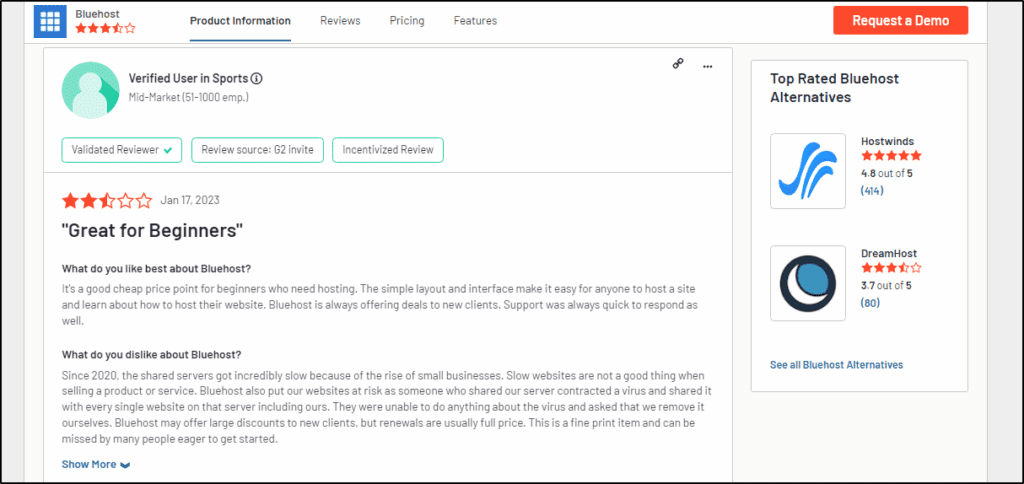

And here’s one about Hostinger on Capterra.
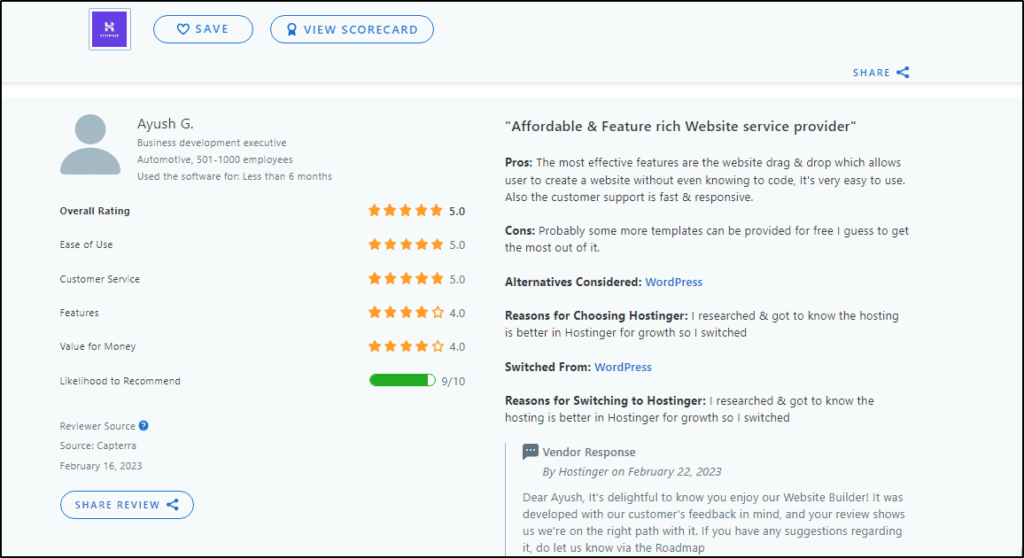

For deeper insights, dive into different Reddit and Quora threads to find first-hand user experiences with different hosting services.
Reading customer reviews helps you understand the potential weaknesses and strengths of a hosting service and gives you the necessary information to make the right call.
Which Web Hosting Service Should You Choose?
There’s no correct answer to this question because every business has different needs, resources, and target audiences.
So, the best way to find the right web hosting company for your business is to evaluate different options using the factors we’ve discussed in this article.
But to make your choice easier, here’s our recommended list of web hosting services for different end users.
- Hostinger – The best value for money in shared hosting
- Nexcess – Best for high-traffic sites
- BlueHost – The most beginner-friendly
- WP Engine – Best for businesses focused on growth
- A2 Hosting – Fastest with lightening server speed
How did we arrive at this conclusion? Read our detailed review of the best web hosting companies to learn more.
Table of Contents

